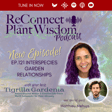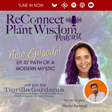
Ep.106 Mastering the Fire Within: Using Anger Strategically
I’ve been sitting with this episode for a while. Honestly, it scared me—because it asked me to revisit my past relationship with anger and how I’ve transformed it. For a long time, I either lashed out or shut down. I didn’t know how to express criticism without burning bridges—or how to fight for what mattered without destroying everything in my path.
In this episode, I explore how nature helped me reframe anger—not as a reaction, but as a sacred spark. Plants like kudzu, dandelion, and mistletoe taught me that taking up space, standing firm, or even disrupting the ecosystem can be acts of deep service. It’s not about balance—it’s about flow. Compassion and strength are not opposites. And righteous anger can be a force for regeneration.
Let’s talk about mastering your fire—so you don’t burn it all down, but light the path forward.
Topics Covered about anger and personal growth
➡️ Suppressing anger is not the same as choosing peace
➡️ Nature uses aggression strategically—so can we
➡️ Righteous anger is a sacred motivator, not a weapon
➡️ Plants teach us how to disrupt and rebuild in harmony
Chapters
00:00 Why This Episode Scared Me to Make
05:08 When Compassion Isn’t Enough
10:56 Understanding Anger’s Ecosystem Role
15:01 Eco-Conscious Business Partner: The Shift Network
28:01 Aggressive Plants as Strategic Allies
35:43 Strategic Fire: When to Use Anger, and How
43:01 How to Disrupt Without Destroying
51:51 What Plants Teach Us About Flowing Between Force and Softness
Resources Mentioned
🌱 Shift Network
🌱 Personalized mentorship with me and the Plants
Expanded Show Notes
☝🏽ReConnect with Plant Wisdom podcast Ancient and modern knowledge from biology to spirituality about the wondrous ways plants help you lead a Naturally Conscious life.
Subscribe here and on your favorite podcast player.
👉🏽 Join the Naturally Conscious Community to nourish human-plant relationships
// Get to Know Me, Tigrilla //
// Let's Work Together //
// Shop from EcoConscious Partners //
Shift Network
More Partners
Opening and Closing music by @Cyberinga and Poinsettia.
// Let's Connect on Social // Facebook | Instagram | LinkedIn | Youtube



















